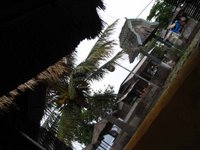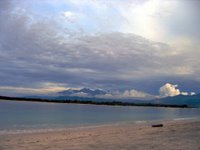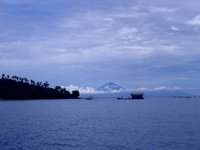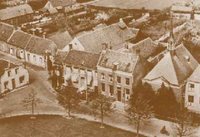Thursday, March 29, 2007
blog closed till blogger solves its issues... (and me mine)
First, I am trying to restore (re-install?) a few "extensions" gathered from my older selves and it requires to be worked out.
Second, I'm in a quite frustrating process regarding üç ekoloji (don't worry, there will be a new issue. it is being worked on..) and my job (which consists of a lot of organisational work these days, which I do not particularly enjoy although I understand the necessity).
Third, I am a little overwhelmed with arraging flights, visas etc. There will be a lot of travelling to be done in the next few months. At some point I will be in Turkey, although I will only have a few days and they are reserved to see family mostly. Then there is the US trip that I need to arrange the visa for.
Fourth, I am very busy. I dislike being busy, and yet for a few months (at least) there isn't much I can do about it. And it isn't just work. It is spring and social life in Amsterdam is reappearing, I will see Mattheus Passion with Witho (can't wait!), I'm trying to study Dutch (yes, by myself, and thanks to heather this time it is more structured. Don't believe Dutch people that say they have a) no grammer, b) too complicated a grammer that noone can understand, c) if you hear things around you you can miraculously start speaking Dutch)
Finally, I have recently been questioned and confronted to no avail by persons that know me best. I am not sure how to make use of all this insight, nor paying too much attention to what might easily become a personal crisis. No time to be depressed. And I doubt being depressed helps anything at all. So I read, and cycle around town, and keep myself busy while every now and then I find pathways to these deeper levels I have to focus on at some point.
Solitude is good. I am enjoying it.
But I will be posting less regularly for another while. Hopefully when I do, I will have LOTS to reflect on! :)
Till then!
ps. here is something I read and liked the other day (sheds some light on the conflicts of modern womanhood):
The Ally McBeal in us: The importance of role models in identity formation
Saturday, March 24, 2007
Sunday, March 18, 2007
Kerinçsiz and Wilders -the perfect duo
Note for the Turkish readers, Geert Wilders is the leader of the ultra-right-wing, racist PVV ("freedom" party) of the Netherlands. He recently suggested the Muslims to tear away Kuran pages as he found them against his perception of freedom.
Note for the Dutch readers, Kemal Kerinçsiz is a lawyer who takes it upon himself to file charges against anyone that does not agree with the state position regarding national issues, as he thinks a number of people "insult Turkishness".
examples: Elif Şafak (2)
Hrant Dink
Orhan Pamuk
It seems that the fascists of the world are uniting, particularly against Albayrak these days, but who knows when it will be our turn.
Both news from Expatica,16 March 2007
Wilders wants clarification on Albayrak
Faction leader Geert Wilders of the Freedom Party (PVV) wants clarification from Prime Minister Jan Peter Balkenende on charges that a Turkish lawyer has threatened to bring against state secretary for justice Nebahat Albayrak.
If the threat should actually result in criminal charges, then Balkenende should urge Albayrak to relinquish her Turkish nationality or resign as state secretary. Wilders wrote in written questions to the prime minister today.
Turkish lawyer Kemal Kerinsciz said on a television programme on Thursday that he was considering filing charges against Albayrak on grounds of "insulting Turkish identity" because of her participation in a government that condemns the Armenian genocide of 1915. Turkey officially denies that any genocide took place.
Wilders has said in the past that Albayrak should resign because of her status as a dual national. He submitted a motion to force the resignation of Albayrak and social affairs state secretary Ahmed Aboutaleb, who is also a dual national, but got not support from others in Parliament.
Wilders sees Kerinsciz's comments as confirmation that government members with dual nationality could find themselves faced with problems of loyalty. He wants to know from Balkenende why the prime minister did not mention anything about possible charges against Albayrak in the debate on the government policy statement.
Albayrak said she is waiting to see if any action will actually be taken against her by the Turkish lawyer before responding.
Lawyer threatens Albayrak with charges
Turkish lawyer Kemal Kerincsiz is threatening to file charges against State secretary for justice Nebahat Albayrak. He has warned the state secretary not to insult her country of origin. The ultra-nationalist lawyer said it was best for Albayrak to relinquish her Turkish passport since she was serving in a government that condemns the Armenian genocide.
Kerincsiz said this on Thursday on the current affairs programme Eén Vandaag. The threat of charges coincides with the discussion on dual nationality in the Netherlands. State secretary Albayrak hold both Dutch and Turkish nationality. In a reaction she said via a spokesperson that she would wait to see whether actual charges were filed.
Kerincsiz has filed charges in the past against Turkish writer Orhan Pamuk and ethnic Armenian journalist Hrant Dink, who was murdered in January. In Dink's case the charges led to a conviction, though the case against Pamuk was dropped by the court in Istanbul because of international pressure.
The lawyer is invoking controversial article 301 of the Turkish penal code, which lists insulting Turkish identity as a crime.
While Albayrak was member of Parliament in 2004 she supported a motion calling for recognition of the Armenian genocide. That motion was unanimously adopted and taken on by the cabinet as well. On last night's television programme Kerincsiz expressed his displeasure at Albayrak's support for this motion.
Half of Dutch work below ability
"More than 50 percent of Dutch people are working below their ability. One third is bothered by this and is therefore seeking other employment. One quarter is looking for another job because they want a better salary.This emerged from a study by the NationaleVacaturebank.nl (national databank of job vacancies) published on Friday. The organisation surveyed 509 people. Only 32.5 percent of those interviewed said they were happy with their work.
This is striking since a study by ZebraZone published yesterday reported that a far higher percentage of Dutch go to work with pleasure."
Tuesday, March 13, 2007
Walden -Henry David Thoreau

Chapter1 -Economy A. 19
Most of the luxuries, and many of the so-called comforts of life, are not only not indispensable, but positive hindrances to the elevation of mankind. With respect to luxuries and comforts, the wisest have ever lived a more simple and meagre life than the poor. The ancient philosophers, Chinese, Hindoo, Persian, and Greek, were a class than which none has been poorer in outward riches, none so rich in inward. We know not much about them. It is remarkable that we know so much of them as we do. The same is true of the more modern reformers and benefactors of their race. None can be an impartial or wise observer of human life but from the vantage ground of what we should call voluntary poverty. Of a life of luxury the fruit is luxury, whether in agriculture, or commerce, or literature, or art. There are nowadays professors of philosophy, but not philosophers. Yet it is admirable to profess because it was once admirable to live. To be a philosopher is not merely to have subtle thoughts, nor even to found a school, but so to love wisdom as to live according to its dictates, a life of simplicity, independence, magnanimity, and trust. It is to solve some of the problems of life, not only theoretically, but practically. The success of great scholars and thinkers is commonly a courtier-like success, not kingly, not manly. They make shift to live merely by conformity, practically as their fathers did, and are in no sense the progenitors of a noble race of men. But why do men degenerate ever? What makes families run out? What is the nature of the luxury which enervates and destroys nations? Are we sure that there is none of it in our own lives? The philosopher is in advance of his age even in the outward form of his life. He is not fed, sheltered, clothed, warmed, like his contemporaries. How can a man be a philosopher and not maintain his vital heat by better methods than other men?
Complete text
Librivox (e-book)
Thursday, March 08, 2007
QuOte Of tHE MoOd
- Reality is that which, when you stop believing in it, doesn't go away.
- Philip K. Dick
Tuesday, March 06, 2007
V4. P1. Carnaval in Hilvarenbeek

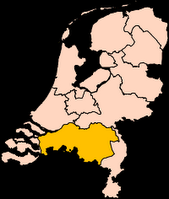 The first one was to Brabant (North Brabant, is in the south of the Netherlands) for the Carnival (CARNAVAL as they put it). Actually, first to Tilburg (town), and then to Hilvarenbeek (village). The smaller it got, the better it became...
The first one was to Brabant (North Brabant, is in the south of the Netherlands) for the Carnival (CARNAVAL as they put it). Actually, first to Tilburg (town), and then to Hilvarenbeek (village). The smaller it got, the better it became...Wiki enlightens us again:
“In the Netherlands where it iscalled 'Karnaval', 'Carnaval', 'Vastenavond' or 'Vastelaovend' the last day of Carnival, the day before Ash Wednesday, is held exactly 40 days (not counting Sundays) before Easter. Dutch Carnival is most celebrated in Catholic regions, mostly the southern provinces Noord Brabant and Limburg, where it is also known as Vastenavond or Vastelaovend (literally "Fasting evening", although that strictly refers only to the last day, whereas Carnaval in the Netherlands usually
begins on the Saturday before Ash Wednesday). The most popular places where Carnival is held (although every city, town or village celebrates it) are Maastricht, Roermond, Venlo, 's-Hertogenbosch, Bergen op Zoom and Breda. Carnival here has been celebrated ever since mediaeval times and was modernised after WW II, when Bergen op Zoom even continued to celebrate it indoors. However, it is the most southern province of The Netherlands, Limburg, where many Dutch go to celebrate i
t. During the event, every town is one big party.
During Dutch Carnival, many traditions are kept alive, first of all the parade with dressed-up groups, musicians and elaborate build show-vehicles, a fake prince plus cortège ('Council of 11'), the boerenbruiloft (farmer's wedding) and the haring happen (eating herring) at Ash Wednesday but the traditions vary from town to town.There are three types of Carnival celebrated in The Netherlands. The best known variant is known as the Rijnlandsche Carnival and it shares many folklore traditions with its German and Belgian counterparts. Maastricht is famous not so much for its parades but for its street carnival, with elaborate costumes that people work on all year, a bit like the South American style, but with a strong accent on humour, and not unlike Italian, mostly Venician, traditions, culture and costumes. The third variant can be found in 's-Hertogenbosch, Breda, Steenbergen and Bergen op Zoom. The Carnival in Den Bosch is known as the old
est in the Netherlands. Several paintings of the world famous Jheronimus Bosch, who lived in the city in the 15th century, are based on the carnival festivities in the city during the Middle Ages. The oldest known Carnival festivities in 's-Hertogenbosch date from 1385. In 1882 De Oeteldonksche Club was founded to secure the future of Carnival in 's-Hertogenbosch. The Carnival of Bergen op Zoom shares most traditions with 's Hertogenbosch and very few traditions and folklore with the rest of the Netherlands and they have celebrated it in their specific way ever since 1839.”
 First and foremost, to most my Dutch friends’ surprise, I had a great time (without getting really drunk). I did have to dress up, though, as a cat in an identity crisis (with Mickey Mouse ears), trying to assume I was making a political statement against bio-technology…
First and foremost, to most my Dutch friends’ surprise, I had a great time (without getting really drunk). I did have to dress up, though, as a cat in an identity crisis (with Mickey Mouse ears), trying to assume I was making a political statement against bio-technology…
As I was warned, the carnival indeed had drunken people and bad music. But that wasn’t all.  It was a fertile field of social observation particularly of middle class provincial Dutch life. Moreover, to my surprise, there was a rather ok band in one of the parties we have been to. The Theo Maassen song was cool, and it was not as translation proof as Harro suggested (lyrics and song url).
It was a fertile field of social observation particularly of middle class provincial Dutch life. Moreover, to my surprise, there was a rather ok band in one of the parties we have been to. The Theo Maassen song was cool, and it was not as translation proof as Harro suggested (lyrics and song url).
Moreover there were a lot of little details I could hardly imagine figuring out elsewhere. Those I cannot possibly list and describe... But here are some more significant observations (thanks to Eric’s endless efforts of interpretation).
 It's not hard to imagine that once upon a time, once every year, during carnival (before the hungry and cold days started) the feudal classes were being disregarded for a few days (i.e. the rules were off). You can see little bits of it in the comical Mass on Sunday morning, the policeman in pic, the whole process of the prince being given the keys to the city etc. I was told that in Limburg, people actually get dressed up so as not to get recognised, which demonstrates a similar idea.
It's not hard to imagine that once upon a time, once every year, during carnival (before the hungry and cold days started) the feudal classes were being disregarded for a few days (i.e. the rules were off). You can see little bits of it in the comical Mass on Sunday morning, the policeman in pic, the whole process of the prince being given the keys to the city etc. I was told that in Limburg, people actually get dressed up so as not to get recognised, which demonstrates a similar idea.
 The youth and how they are taking over the carnival was amazing. They had trucks of terribly drunk/drugged teenagers with hiphop and trance music shouting all over the town. It seems to be a change for not everyone looked very pleased about them, yet, I can imagine it was the case in their earlier years as well… (I particularly enjoyed the opportunity to dance without the necessity of making sense, which I thought was hard to find here.)
The youth and how they are taking over the carnival was amazing. They had trucks of terribly drunk/drugged teenagers with hiphop and trance music shouting all over the town. It seems to be a change for not everyone looked very pleased about them, yet, I can imagine it was the case in their earlier years as well… (I particularly enjoyed the opportunity to dance without the necessity of making sense, which I thought was hard to find here.)
I tried quite a few new brands of beer, and just because we were hanging around we were given a tour of the windmill and a very impressive 17th century brewery (unfortunately only in dutch but in great detail on their website).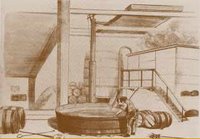
The brewery has its remarkable story of being opened and closed several times due to difficulties and it was a sweet little building, with a warm and old (in a good way) atmosphere. The best thing (other than the people inside),  was of course the beer itself...
was of course the beer itself...
The mill gave me the required height to see around (and it still amazes me everytime no notice how flat a country I live in...). It seems that in feudal times, millers were important actors for the taxation system. (“not the water  millers!”, we were warned… “They were only employees…” But the ones that made the flour, those were the important guys... There was a nice herb garden right outside the mill, and all around the place there were a lot of horses to talk to and space to bike around. This gave me the nature myth back. I love seeing horses. I just can’t stop being happy.
millers!”, we were warned… “They were only employees…” But the ones that made the flour, those were the important guys... There was a nice herb garden right outside the mill, and all around the place there were a lot of horses to talk to and space to bike around. This gave me the nature myth back. I love seeing horses. I just can’t stop being happy.
 The trip also gave me my small is beautiful myth back. I enjoy myself in small towns and villages. I wouldn’t live there, but that’s the tragedy of the modern age… It seems that such a small but “proper” place would be a natural choice for a lot of people who
The trip also gave me my small is beautiful myth back. I enjoy myself in small towns and villages. I wouldn’t live there, but that’s the tragedy of the modern age… It seems that such a small but “proper” place would be a natural choice for a lot of people who  immensely dislike metropolitans and yet feel that they need all possible access to highly technological artefacts. This seems a better solution to rapid urbanisation, than forgetting about and mystifying the village life (as we do in Turkey).
immensely dislike metropolitans and yet feel that they need all possible access to highly technological artefacts. This seems a better solution to rapid urbanisation, than forgetting about and mystifying the village life (as we do in Turkey).
Yet, it did have its own problems, of course…
The topping was the Gothic churches I had the chance to see… (one extra point for Catholics against Protestants again). The special prize goes to St. Petrus in Hilvarenbeek for obvious reasons.
Here is what a church architecture website says about it:
“A quick look at the the church of Hilvarenbeek immediately makes clear that this isn't a simple village church. In ca. 1150 a chapter was founded in Hilvarenbeek, which made the village an important centre of religious life. A previous church was replaced in the 14th century. The current church is the result of many changes to that one.
 The nave still largely dates from the 14th century while the choir dates from the first half of the 15th century. The transept is slightly younger, but was heightened between 1520 and 1527. For the walls of the choir and the northern transept-arm tuff was used as well as brick. The northern side-aisle was added in the 15th century and heightened in 1557, after which shares its roof with the nave. The southern side-aisle probably dates from the first quarter of the 16th century. Unlike the northern side-aisle this one is as heigh and wide as the nave.
The nave still largely dates from the 14th century while the choir dates from the first half of the 15th century. The transept is slightly younger, but was heightened between 1520 and 1527. For the walls of the choir and the northern transept-arm tuff was used as well as brick. The northern side-aisle was added in the 15th century and heightened in 1557, after which shares its roof with the nave. The southern side-aisle probably dates from the first quarter of the 16th century. Unlike the northern side-aisle this one is as heigh and wide as the nave.
 The tower is one of the prettiest examples of Campine Gothicism (see Gothicism). It was built in ca. 1450, after fire had destroyed its predecessor. The new tower was built several metres to the west, thus allowing for the nave to be lenthened with one trave. The distinctive spire was added between 1615 and 1621, after the old one had been struck by lightning.
The tower is one of the prettiest examples of Campine Gothicism (see Gothicism). It was built in ca. 1450, after fire had destroyed its predecessor. The new tower was built several metres to the west, thus allowing for the nave to be lenthened with one trave. The distinctive spire was added between 1615 and 1621, after the old one had been struck by lightning.
The Eighty Years-War made an end to Hilvarenbeek's golden age. The renewal of the spire was made during the Twelve Years-truce (1609-1621), but by 1636 Hilvarenbeek had fallen in the hands  of the protestants, who banned the catholic faith and took the big church for their own use in 1642. Four canons of the Hilvarenbeek chapter founded a new church near Rovert (now in Belgium), just over the border on territory that remained catholic, where they held services for the people from their former village. In 1671 a hidden church could be opened in Hilvarenbeek itself. In 1799 the St. Petrus was finally given back to the catholics. After repairs the church could be used again in 1801.”
of the protestants, who banned the catholic faith and took the big church for their own use in 1642. Four canons of the Hilvarenbeek chapter founded a new church near Rovert (now in Belgium), just over the border on territory that remained catholic, where they held services for the people from their former village. In 1671 a hidden church could be opened in Hilvarenbeek itself. In 1799 the St. Petrus was finally given back to the catholics. After repairs the church could be used again in 1801.”
You are terrorists, we are virtuous
Yitzhak Laor on the IDF
Source: London Review of Books, 3 AugustAs soon as the facts of the Bint Jbeil ambush, which ended with relatively high Israeli casualties (eight soldiers died there), became public, the press and television in Israel began marginalising any opinion that was critical of the war. The media also fell back on the kitsch to which Israelis grow accustomed from childhood: the most menacing army in the region is described here as if it is David against an Arab Goliath. Yet the Jewish Goliath has sent Lebanon back 20 years, and Israelis themselves even further: we now appear to be a lynch-mob culture, glued to our televisions, incited by a premier whose ‘leadership’ is being launched and legitimised with rivers of fire and destruction on both sides of the border. Mass psychology works best when you can pinpoint an institution or a phenomenon with which large numbers of people identify. Israelis identify with the IDF, and even after the deaths of many Lebanese children in Qana, they think that stopping the war without scoring a definitive victory would amount to defeat. This logic reveals our national psychosis, and it derives from our over-identification with Israeli military thinking.
In the melodramatic barrage fired off by the press, the army is assigned the dual role of hero and victim. And the enemy? In Hebrew broadcasts the formulations are always the same: on the one hand ‘we’, ‘ours’, ‘us’; on the other, Nasrallah and Hizbullah. There aren’t, it seems, any Lebanese in this war. So who is dying under Israeli fire? Hizbullah. And if we ask about the Lebanese? The answer is always that Israel has no quarrel with Lebanon. It’s yet another illustration of our unilateralism, the thundering Israeli battle-cry for years: no matter what happens around us, we have the power and therefore we can enforce the logic. If only Israelis could see the damage that’s been done by all these years of unilateral thinking. But we cannot, because the army – which has always been the core of the state – determines the shape of our lives and the nature of our memories, and wars like this one erase everything we thought we knew, creating a new version of history with which we can only concur. If the army wins, its success becomes part of ‘our heritage’. Israelis have assimilated the logic and the language of the IDF – and in the process, they have lost their memories. Is there a better way to understand why we have never learned from history? We have never been a match for the army, whose memory – the official Israeli memory – is hammered into place at the centre of our culture by an intelligentsia in the service of the IDF and the state.
The IDF is the most powerful institution in Israeli society, and one which we are discouraged from criticising. Few have studied the dominant role it plays in the Israeli economy. Even while they are still serving, our generals become friendly with the US companies that sell arms to Israel; they then retire, loaded with money, and become corporate executives. The IDF is the biggest customer for everything and anything in Israel. In addition, our high-tech industries are staffed by a mixture of military and ex-military who work closely with the Western military complex. The current war is the first to become a branding opportunity for one of our largest mobile phone companies, which is using it to run a huge promotional campaign. Israel’s second biggest bank, Bank Leumi, used inserts in the three largest newspapers to distribute bumper stickers saying: ‘Israel is powerful.’ The military and the universities are intimately linked too, with joint research projects and an array of army scholarships.
There is no institution in Israel that can approach the army’s ability to disseminate images and news or to shape a national political class and an academic elite or to produce memory, history, value, wealth, desire. This is the way identification becomes entrenched: not through dictatorship or draconian legislation, but by virtue of the fact that the country’s most powerful institution gets its hands on every citizen at the age of 18. The majority of Israelis identify with the army and the army reciprocates by consolidating our identity, especially when it is – or we are – waging war.
The IDF didn’t play any role in either of the Gulf wars and may not play a part in Bush’s pending war in Iran, but it is on permanent alert for the real war that is always just round the corner. Meanwhile, it harasses Palestinians in the West Bank and Gaza, to very destructive effect. (In July it killed 176 Palestinians, most of them from the same area in Gaza, in a ‘policing’ operation that included the destruction of houses and infrastructure.) They shoot. They abduct. They use F-16s against refugee camps, tanks against shacks and huts. For years they have operated in this way against gangs and groups of armed youths and children, and they call it a war, a ‘just war’, vital for our existence. The power of the army to produce meanings, values, desire is perfectly illustrated by its handling of the Palestinians, but it would not be possible without the support of the left in Israel.
The mainstream left has never seriously tried to oppose the military. The notion that we had no alternative but to attack Lebanon and that we cannot stop until we have finished the job: these are army-sponsored truths, decided by the military and articulated by state intellectuals and commentators. So are most other descriptions of the war, such as the Tel Aviv academic Yossef Gorni’s statement in Haaretz, that ‘this is our second war of independence.’ The same sort of nonsense was written by the same kind of people when the 2000 intifada began. That was also a war about our right to exist, our ‘second 1948’. These descriptions would not have stood a chance if Zionist left intellectuals – solemn purveyors of the ‘morality of war’ – hadn’t endorsed them.
Military thinking has become our only thinking. The wish for superiority has become the need to have the upper hand in every aspect of relations with our neighbours. The Arabs must be crippled, socially and economically, and smashed militarily, and of course they must then appear to us in the degraded state to which we’ve reduced them. Our usual way of looking at them is borrowed from our intelligence corps, who ‘translate’ them and interpret them, but cannot recognise them as human beings. Israelis long ago ceased to be distressed by images of sobbing women in white scarves, searching for the remains of their homes in the rubble left by our soldiers. We think of them much as we think of chickens or cats. We turn away without much trouble and consider the real issue: the enemy. The Katyusha missiles that have been hitting the north of the country are launched without ‘discrimination’, and in this sense Hizbullah is guilty of a war crime, but the recent volleys of Katyushas were a response to the frenzied assault on Lebanon. To the large majority of Israelis, however, all the Katyushas prove is what a good and necessary thing we have done by destroying our neighbours again: the enemy is indeed dangerous, it’s just as well we went to war. The thinking becomes circular and the prophecies self-fulfilling. Israelis are fond of saying: ‘The Middle East is a jungle, where only might speaks.’ See Qana, and Gaza, or Beirut.
Defenders of Israel and its leaders can always argue that the US and Britain behave similarly in Iraq. (It is true that Olmert and his colleagues would not have acted so shamelessly if the US had not been behind them. Had Bush told them to hold their fire, they wouldn’t have dared to move a single tank.) But there is a major difference. The US and Britain went to war in Iraq without public opinion behind them. Israel went to war in Lebanon, after a border incident which it exploited in order to destroy a country, with the overwhelming support of Israelis, including the members of what the European press calls the ‘peace camp’.
Amos Oz, on 20 July, when the destruction of Lebanon was already well underway, wrote in the Evening Standard: ‘This time, Israel is not invading Lebanon. It is defending itself from a daily harassment and bombardment of dozens of our towns and villages by attempting to smash Hizbullah wherever it lurks.’ Nothing here is distinguishable from Israeli state pronouncements. David Grossman wrote in the Guardian, again on 20 July, as if he were unaware of any bombardment in Lebanon: ‘There is no justification for the large-scale violence that Hizbullah unleashed this week, from Lebanese territory, on dozens of peaceful Israeli villages, towns and cities. No country in the world could remain silent and abandon its citizens when its neighbour strikes without any provocation.’ We can bomb, but if they respond they are responsible for both their suffering and ours. And it’s important to remember that ‘our suffering’ is that of poor people in the north who cannot leave their homes easily or quickly. ‘Our suffering’ is not that of the decision-makers or their friends in the media. Oz also wrote that ‘there can be no moral equation between Hizbullah and Israel. Hizbullah is targeting Israeli civilians wherever they are, while Israel is targeting mostly Hizbullah.’ At that time more than 300 Lebanese had been killed and 600 had been injured. Oz went on: ‘The Israeli peace movement should support Israel’s attempt at self-defence, pure and simple, as long as this operation targets mostly Hizbullah and spares, as much as possible, the lives of Lebanese civilians (this is not always an easy task, as Hizbullah missile-launchers often use Lebanese civilians as human sandbags).’
The truth behind this is that Israel must always be allowed to do as it likes even if this involves scorching its supremacy into Arab bodies. This supremacy is beyond discussion and it is simple to the point of madness. We have the right to abduct. You don’t. We have the right to arrest. You don’t. You are terrorists. We are virtuous. We have sovereignty. You don’t. We can ruin you. You cannot ruin us, even when you retaliate, because we are tied to the most powerful nation on earth. We are angels of death.
The Lebanese will not remember everything about this war. How many atrocities can a person keep in mind, how much helplessness can he or she admit, how many massacres can people tell their children about, how many terrorised escapes from burning houses, without becoming a slave to memory? Should a child keep a leaflet written by the IDF in Arabic, in which he is told to leave his home before it’s bombed? I cannot urge my Lebanese friends to remember the crimes my state and its army have committed in Lebanon.
Israelis, however, have no right to forget. Too many people here supported the war. It wasn’t just the nationalist religious settlers. It’s always easy to blame the usual suspects for our misdemeanours: the scapegoating of religious fanatics has allowed us to ignore the role of the army and its advocates within the Zionist left. This time we have seen just how strongly the ‘moderates’ are wedded to immoderation, even though they knew, before it even started, that this would be a war against suburbs and crowded areas of cities, small towns and defenceless villages. The model was our army’s recent actions in Gaza: Israeli moderates found these perfectly acceptable.
It was a mistake for those of us who are unhappy with our country’s policies to breathe a sigh of relief after the army withdrew from Lebanon in 2000. We thought that the names of Sabra and Shatila would do all the memorial work that needed to be done and that they would stand, metonymically, for the crimes committed in Lebanon by Israel. But, with the withdrawal from Gaza, many Israelis who should be opposing this war started to think of Ariel Sharon, the genius of Sabra and Shatila, as a champion of peace. The logic of unilateralism – of which Sharon was the embodiment – had at last prevailed: Israelis are the only people who count in the Middle East; we are the only ones who deserve to live here.
This time we must try harder to remember. We must remember the crimes of Olmert, and of our minister of justice, Haim Ramon, who championed the destruction of Lebanese villages after the ambush at Bint Jbeil, and of the army chief of staff, Dan Halutz. Their names should be submitted to The Hague so they can be held accountable.
Elections are a wholly inadequate form of accountability in Israel: the people we kill and maim and ruin cannot vote here. If we let our memories slacken now, the machine-memory will reassert control and write history for us. It will glide into the vacuum created by our negligence, with the civilised voice of Amos Oz easing its path, and insert its own version. And suddenly we will not be able to explain what we know, even to our own children.
In Israel there is still no proper history of our acts in Lebanon. Israelis in the peace camp used to carry posters with the figure ‘680’ on them – the number of Israelis who died during the 1982 invasion. Six hundred and eighty Israeli soldiers. How many members of that once sizeable peace camp protested about the tens of thousands of Lebanese, Palestinian and Syrian casualties? Isn’t the failure of the peace camp a result of its inability to speak about the cheapness of Arab blood? General Udi Adam, one of the architects of the current war, has told Israelis that we shouldn’t count the dead. He meant this very seriously and Israelis should take him seriously. We should make it our business to count the dead in Lebanon and in Israel and, to the best of our abilities, to find out their names, all of them.
Sunday, March 04, 2007
V2.D.P1= Christmas Plans and Way to the Gilis
 Once the Kalimantan Adventure was over, it was time for Lombok and Gilis. However, our trip didn't start as we have planned it.
Once the Kalimantan Adventure was over, it was time for Lombok and Gilis. However, our trip didn't start as we have planned it.First the Christmas day:
We have waited.
We waited in a tiny airport for 12 hours, without knowing whether we would get where we would like to or not. It wasn't fun, more so because it was Christmas and most of my travel mates had habitualisations about that date, which until that day were replaced by the dream of swimming on the day and partying at night. Hence, it was a bit more painful for them, than for me -although I was equally bored... In any case, it was a time to appreciate the persons I travelled with... hence a picture of each of us, once we managed to get to yet another airport, before we ended up in yet another (which we were supposed to go to in the first place, but then it was too late to get to where we wanted to...)
I was happy staying in Lombok for a night, despite our plans, as it happens to be the most beautiful place I have ever seen in my life. I've been there in 2001, and had a dream-like picture of the island. This time, I figured that my memories of Lombok were not so off-the-mark. These first pics are from my earlier visit (when I stayed on the island instead of going to one of the smaller islands close by, which are called St. Gilis):





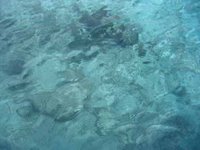
The next morning we made a small boat trip to the biggest one of these smaller isle: Gili Trawangan, which was merely 6km2, (3kms north-south and 2 kms east-west). We took a boat off the Lombok shore (first pic), have seen the volcano on the one side and other boats on the other throughout our little boat trip, and we ended up in the beach you can see in the last photo...
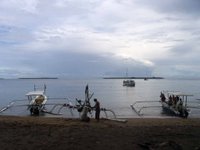
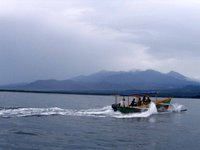
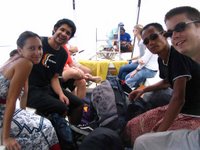

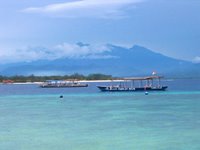
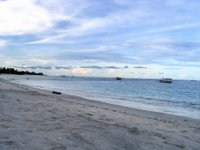
At the end of our first day in Trawangan (which consisted of taking pictures of Lombok among the clouds at a distance, and that of the beach, some snorkelling and mostly relaxing), we decided to call it the horizontal island because of the limited activities one can busy herself with in an island of that size: namely,
- sleeping (inside or outside),
- snorkelling,
 - lying on the beach while reading and drinking coconuts and tropical cocktails,
- lying on the beach while reading and drinking coconuts and tropical cocktails, - (if rainy) going through the menus in the little pergolas specially designed so that you do not have to be less horizontal then in your bed,
- watching movies (yes, again lying down on big cushions)
- which helped me a lot in regards to catching up with the popular hollywood movies of the year, which I cannot bring myself to watch unless there is nothing else to do...
Yet, I will put the pictures in which we are a bit more vertical than our average of the four days...

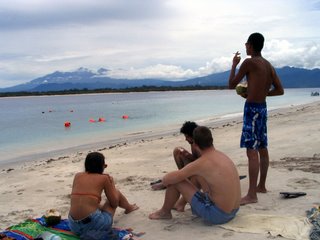


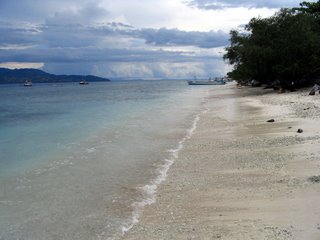

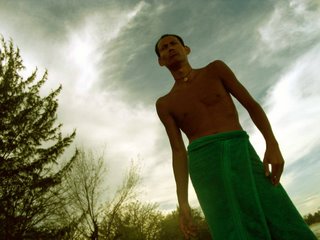 By the end of the second day, we figured there was more to do (I cannot find the correct words to describe horseriding on a paradise beach with Bali and Lombok at a distance, while the sun is slowly setting and the moon is rising)...
By the end of the second day, we figured there was more to do (I cannot find the correct words to describe horseriding on a paradise beach with Bali and Lombok at a distance, while the sun is slowly setting and the moon is rising)...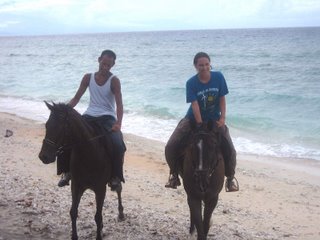
 I was hard to describe the amount of sheer peace and pleasure in general... A part this resulted from the lack of the internet, computers (and in our case mobile phones, too). I felt that naturally inclined to be happy and I was constantly obliged to do great things, and none of them required much effort..
I was hard to describe the amount of sheer peace and pleasure in general... A part this resulted from the lack of the internet, computers (and in our case mobile phones, too). I felt that naturally inclined to be happy and I was constantly obliged to do great things, and none of them required much effort..
But one of the most difficult things would be to describe the colours in trawangan... hence the landscape and underwater pics outnumber all else.
Of course I do have to mention the cat that adopted us for our stay,
 which we didnt bother to name, but spent quite enxtensive amount of time with...
which we didnt bother to name, but spent quite enxtensive amount of time with...A few things I should warn you against (if you think of visiting the island) are: - the "usual" way to and back to the Gilis which we only encountered on our way back (trust the lonely planet on this) - the music (that requires a serious revolution all around the island) - the lack of health care (I presume, for I haven't seen any hospitals, and trust me one DOES see most of the island with a little curiousity) - the strong urge to do nothing -literally- - poverty disguised with a community living in and of nature (which did require me to revise a few theories)...
This is the last post of my trip to Indonesia, through which I felt I grew and fell in love with a country I had no obvious ties with. I am sure I will go back.
I will end this marvellous trip with pictures of the beach we watched for four or five days, and a goodbye... thanks for the patience (and special thanks to everyone who made it possible, better, and deeper)


